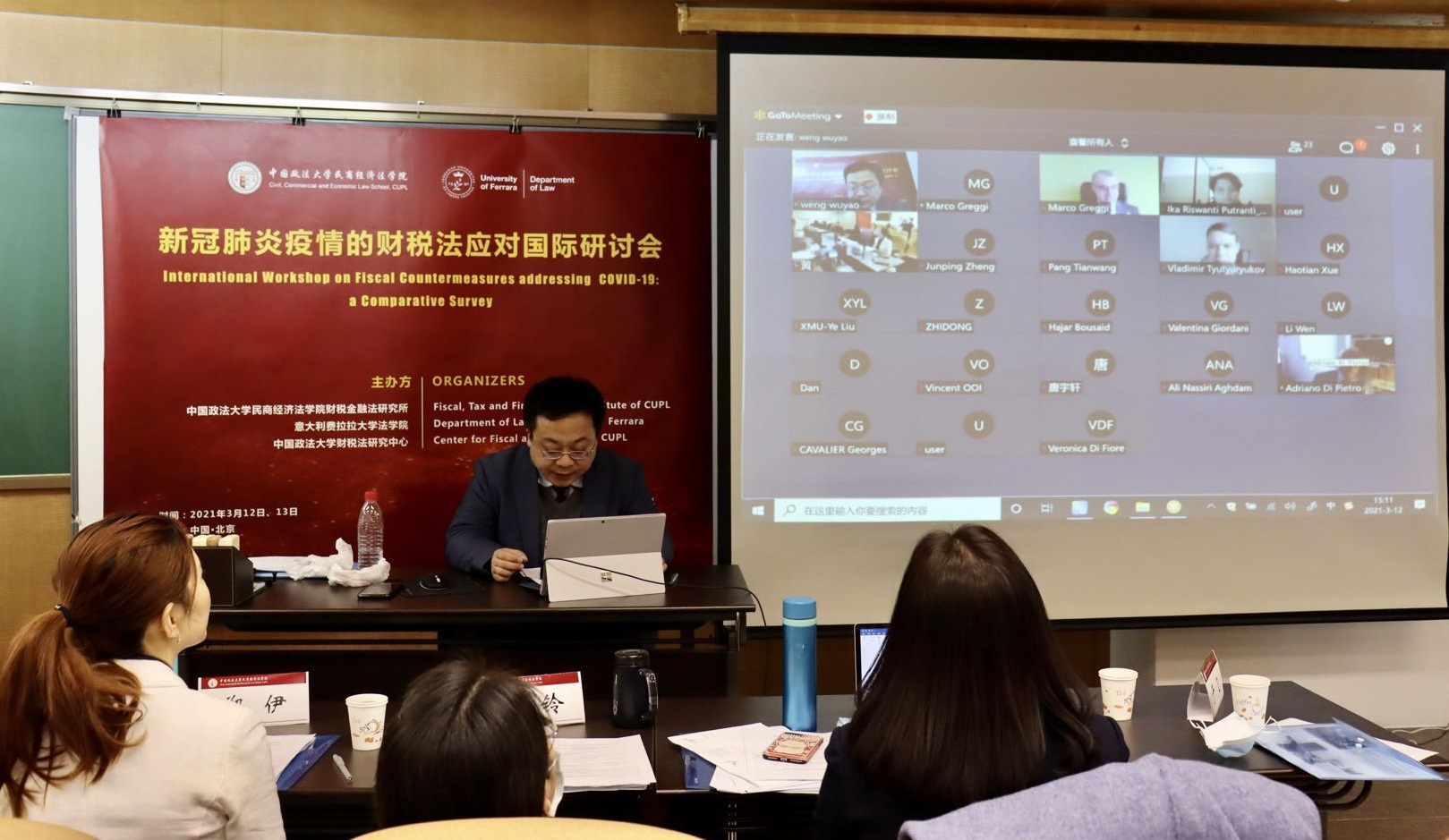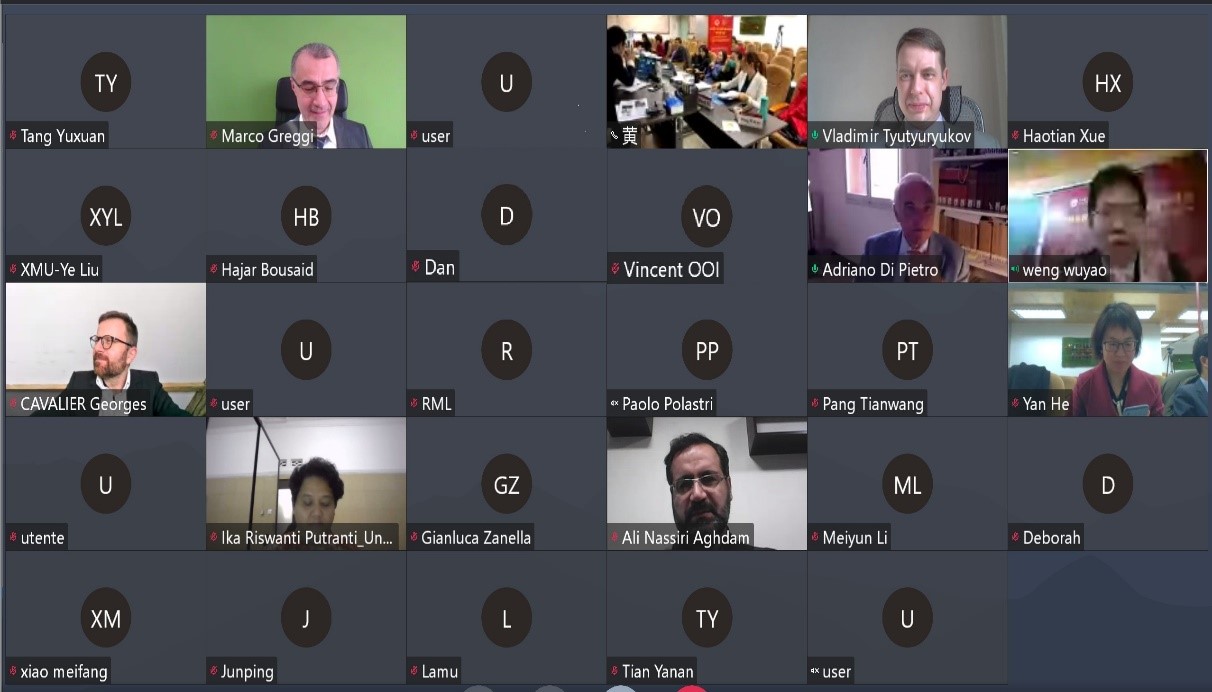On March 12 and 13, 2021, the international workshop themed "Fiscal Countermeasures addressing COVID-19: A Comparative Survey" jointly organized by the Fiscal, Tax and Financial Law Institute of School of Civil, Commercial and Economic Law (CCELS) of CUPL, Department of Law of University of Ferrara and the Center for Fiscal and Tax Law of CUPL was successfully held. The workshop was held in the form of a combination of offline and online. The experts and scholars from domestic and foreign universities, including University of Ferrara (Italy), University of Bologna (Italy), Diponegoro University (Indonesia), Higher School of Economics (Russia), Allameh Tabataba’i University (Iran), Tilburg University (Netherlands), Pablo de Olavide University (Spain), University of Lyon (France), China University of Political Science and Law, Capital University of Economics and Business, Nanchang University, and China Taxation Magazine House of STA were invited to attended the workshop.


On the first day, Weng Wuyao, associate professor and director of the Fiscal, Tax and Financial Law Institute of CUPL, hosted the opening ceremony. The first speech was delivered by professor Yu Fei, Dean of CCELS. He expressed his gratitude to the Department of Law of University of Ferrara for co-organizing this meeting and his warm welcome to all experts and scholars from home and abroad to participate in this workshop. Then he affirmed the significance of this workshop and the achievements made by the Fiscal, Tax and Financial Law Institute of CCELS in the research on fiscal and tax law and the related international exchanges, and finally wished this workshop a complete success. Next, Adriano Di Pietro, professor and director of European School of Advanced Tax Studies in University of Bologna, expressed his thanks to the organizers of this workshop for invitation and recognition of the research results on the EU tax law made by European School of Advanced Tax Studies. He also pointed out that the pandemic imposes a difficult and painful choice which may force governments to decide between contingent tax solutions and structural reforms of the tax system. At last, He wished the workshop a success. Then, Shi Zhengwen, professor and director of the Center for Fiscal and Tax Law of CUPL, gave a speech. He firstly introduced the background of this international workshop and the reason for choosing the topic at issue. Secondly, he mentioned the good and close collaboration relationship between CUPL and Italian universities in taxation law. Then he expressed his expectation for this international workshop, i.e. by comparing the experiences of different countries, finding proper and reasonable solutions to problems related to improvement of the taxation system under the pandemic. Finally, Marco Greggi, professor of Department of Law of University of Ferrara, delivered his speech. He said that he was very happy to co-organize this workshop with CUPL and believed that this workshop was of great significance. Then he expressed his full confidence in the success of this workshop.
The first part “Main Presentations” was hosted by professor Shi Zhengwen. Five speakers gave detailed and in-depth explanations of their experiences of respective countries in terms of existing fiscal and tax measures, their improvements, and the impact on the fiscal and tax systems. The five speakers were: professor Marco Greggi, speaking on “Italian Experiences on Fiscal Countermeasures against COVID-19”, Ika Riswanti Putranti, associate professor of Diponegoro University, speaking on "Indonesian Experiences on Fiscal Countermeasures against COVID-19s", Vladimir Tyutyuryukov, associate professor of University of Higher Economic Research, speaking on "Russian Experiences on Fiscal countermeasures against COVID-19", Ali Nasiri Aghdam, assistant professor of Allameh Tabataba’i University, speaking on "Iranian Experiences on Fiscal Countermeasures against COVID-19", and Zheng Yi, lecturer of CCELS, speaking on "Chinese Experiences on Fiscal Countermeasures against COVID-19 (Direct Taxation) ".
The second part "Discussion and Round Table" was conducted by professor Marco Greggi. The first speaker is Zhou You who is the senior editor of China Taxation Magazine House of STA. Her topic is "How Covid-19 Impacted China's Macroeconomy and
China
’s Response". The second speaker is Du Yuanhang who is the lecturer of CCELS. Her topic is "The Dilemma of China's Structural Tax Reduction in the Post Epidemic Era". Subsequently, the participants held a free discussion and presented some enlightening views. Finally, associate professor Weng Wuyao and professor Marco Greggi made summaries of the day’s meeting.
On the second day, associate professor Weng Wuyao hosted the first part "Main Presentations". Six speakers gave detailed and in-depth explanations of their experiences of respective countries in terms of existing fiscal and tax measures, their improvements, and the impact on the fiscal and tax systems. The first speaker is professor Adriano di Pietro. His presentation Topic is "EU Experiences on Fiscal Countermeasures against COVID-19". The second speaker is He Yan, associate professor of Law School of Capital University of Economics and Business, whose topic is "Chinese Experiences on Fiscal Countermeasures against COVID-19 (Indirect Taxation)". Then, Cees Peters, assistant professor of Tilburg University delivered a speech about "Dutch Experiences on Fiscal Countermeasures against COVID-19". The fourth speaker, Jose Miguel Martin, associate professor of Pablo de Olavide University, gave a speech of "Spanish Experiences on Fiscal Countermeasures against COVID-19". The fifth speaker, Georges Cavalier, professor and director of the Tax LL.M, University of Lyon, gave a presentation of "French Experiences on Fiscal Countermeasures against COVID-19". Finally, Xue Haotian, Ph.D. student in tax law of CUPL, delivered his topic on "Chinese Experiences on Fiscal Countermeasures against COVID-19 (Fiscal Law)".
The second part "Discussion and Round Table" was conducted by professor Marco Greggi. Two Chinese scholars delivered their speeches: Zheng Junping, lecturer of Law School of Nanchang University, speaking on "Fiscal Countermeasures Addressing Covid-19: A Comparative Study", and Liu Jingxuan, postgraduate student in fiscal and tax Law of CUPL, speaking on "Comparative Study of National Fiscal Countermeasures against COVID-19".
Finally, associate professor Weng Wuyao hosted the closing ceremony. Three professors made the concluding remarks. Zhu Xiaojuan, deputy secretary and associate professor of CCELS, expressed her thanks to all participants and emphasized the significance of this workshop. Besides, she pointed out the importance of fiscal and tax (law) countermeasures represented by tax relief and fiscal expenditure in fighting against the pandemic, and that in order to deal with the pressure of fiscal revenue, other measures for increasing tax revenue should be taken, so that the reform of fiscal and tax law system in many countries including China will be affected deeply. Next, professor Marco Greggi mentioned that the public should be aware of the pressure that the COVID-19 is putting on the public finance and a more transparent and fair society requires the efforts of all citizens. Besides, he argued that due to the COVID-19, new rules must be developed to shift the burden to all those who need to be responsible in order to reduce the losses caused by pandemic. Finally, professor Shi Zhengwen made the last remark. He said that the pandemic fight is also an opportunity for which all countries should further strengthen exchange and cooperation, promote fiscal and tax reform, perfect legal system, deepen global governance reform, work together to deal with risks and challenges, and promote the construction of a beautiful homeland for mankind.
During the two-day workshop, Chinese and foreign experts and scholars shared their national experiences on fiscal countermeasures addressing Covid-19 and discussed in depth how the fiscal and tax law systems were affected by the pandemic and how to improve the relevant systems. The success of this international workshop not only helped to sort out the successful experience of China in fiscal and tax (law) responses to the pandemic, but also enhanced the understanding of scholars from different countries on the implementation of fiscal and tax (law) responses to the pandemic and the latest development of relevant tax reform in different countries, which provided the international references for the improvement of China's relevant system and built a bridge for further exchange and cooperation between Chinese and foreign fiscal and tax law.
The international workshop is also supported by Program for Young Innovative Research Team in China University of Political Science and Law (20CXTD08).


